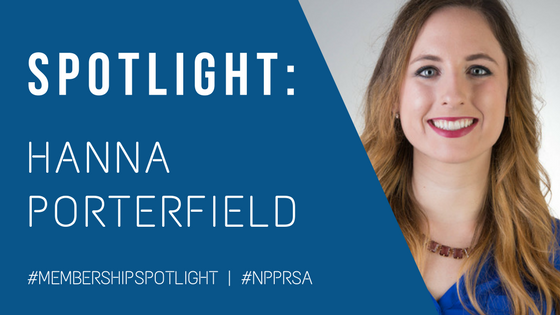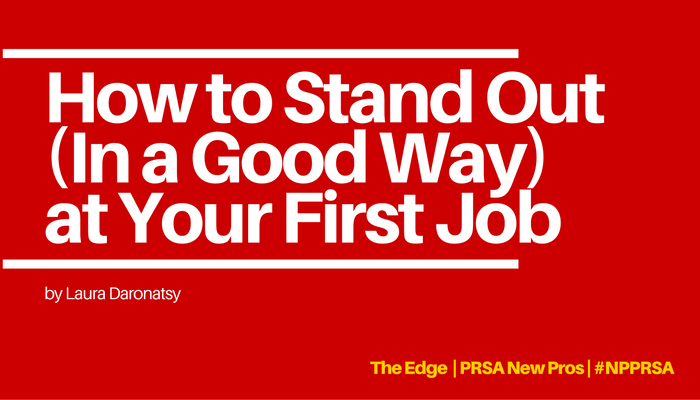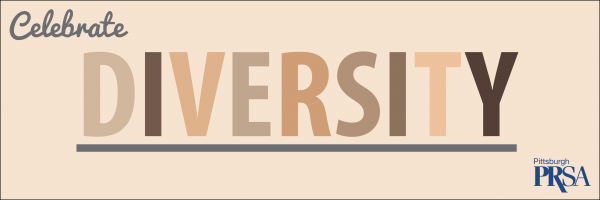Name: Hanna Porterfield
Position/Company: Senior Account Executive at Development Counsellors International
Location: New York, NY
Education: B.S. in Advertising and Specialization in Public Relations, Michigan State University
Social Media Handle: @citygirlhanna
How and when did you first become interested in PR and communications?
It’s funny, I was always reading and writing growing up, but never thought of it as a career because I didn’t necessarily want to be author. I began college as a mathematics major, with a goal to be an actuary. While that didn’t work out, loving numbers still comes in handy for calculating results and ROI of work. After changing my major I looked into advertising and marketing. Public relations was a specialization at the time, and the more I learned, the more it became for me. Internships and PRSSA involvement solidified my career choice.
How did you find internships/jobs?
Well, for internships I looked at my college job website and internship websites that I can’t even remember the name of (and they’ve probably since changed and been updated!). The question I think people actually want answered as a new professional is how to find a full-time position that will launch their career. For this, it takes time; looking for a job can be a full-time job, with late nights sending resumes, cover letters and follow-up notes all while you’re in school or working. I suggest setting up job alerts so that you can get potential positions emailed to you and all of your time isn’t spent going down a rabbit hole searching. LinkedIn and PRSA are good for this. Also think outside the box – literally every type of business needs PR.
I found my first (and current) job by putting my all into it. This means you’re going to have to make sacrifices. For me, that meant setting up 10 interviews during my senior year spring break and paying my way to New York City. When asked in an interview why I wasn’t on the beach, I said I could go to the beach the rest of my life, but I wanted a career in NYC. It paid off and I had two job offers before graduation.
What was the biggest challenge you’ve ever faced in your career? How did you overcome it?
One that comes to mind is when my first boss quit about a year and a half after I’d been at my company. It seemed like the end of the world to have a manager I liked and respected leaving so soon. In the end, it was for the better. Having a team member leave–while probably increasing workload–will ultimately give you an opportunity to step up to the plate and grow. For me, that resulted in my first promotion and an even more supportive manager than I previously had.
What has been the most valuable thing you have learned through classes or experience?
The most valuable things I’ve learned for my career have been though experience, not school, without hesitation. While college classes provide a good foundation, you cannot learn without doing. I cant stress enough the value of internships and your first jobs. When asked to present to public relations classes at my alma mater, I always share case studies of projects I’ve worked on, and try to apply to the topics in their textbooks.
What has been the best piece of advice you have received?
The best piece of advice I’ve received is simply to work hard. My dad instilled the word ‘industrious’ in our family, and that’s really motivated me to work hard no matter what I’m doing, in my career or otherwise.
Do you have any advice for PR pros early in their career?
Keep learning. It’s amazing how much can change in the PR industry just within a couple of years being in it. Read industry news and blogs, and keep any certifications you might have up to date. Bring up professional development budget in your annual salary reviews.
What do you think is the best benefit of PRSA and the New Pros section?
Having a network of PR professionals across the country who are going through similar things as you in their career. From Twitter and LinkedIn to MyPRSA, there’s no shortage of ways to get in touch with other members. While mentors are an important part of your career trajectory, being able to bounce ideas off people who are in a similar role to you, but at a different company, is helpful. Plus, make the connections now and run the world together later!
Is there anything you wish you would have known before becoming a new professional?
Outside of the actual office setting and your first career, I wish I would’ve known to keep balance and that it’s okay to say no to things. I have been extremely involved with lots of organizations during college and since graduating, but am just now learning how to balance priorities and make time for myself. You need time to rejuvenate to thrive. Put your all into organizations and side projects you’re passionate about, but don’t spread yourself too thin. For me, serving PRSA is one of those priorities.
Name one little-known thing about yourself.
I won my hometown’s Punt Pass and Kick in 6th grade for females and went on to the regional competition.
Hanna Porterfield is Chair of PRSA’s New Pros Section and a senior account executive at Development Counsellors International in New York. She is a graduate of Michigan State University. Connect with her on Twitter @citygirlhanna.
If you are interested in being featured, or interested in nominating someone to be featured as a part of our #MemberSpotlight blog series, please complete the following form. Or reach out to us via email at prsanewpro@gmail.com.






